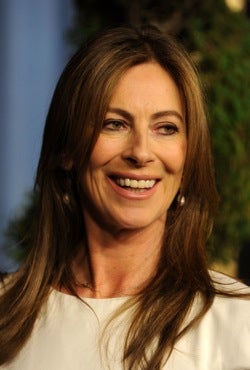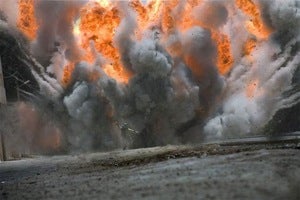On Saturday night in Century City, I ran into Kathryn Bigelow in a hallway outside the Writers Guild Awards ceremony; the “Hurt Locker” director, who minutes earlier had been inside the Hyatt Regency ballroom in a black dress, had changed into jeans and a burnt orange T-shirt and was waiting for screenwriter Mark Boal to finish addressing the press after his win for Original Screenplay.
“We’re going straight to the airport from here,” laughed Bigelow, who was ecstatic over Boal’s win, and legitimately dazzled by the way her film has continued to pick up honors: from DGA to ACE to Critics Choice. (See accompanying artlcle: "Does ‘Hurt Locker Hold All the Oscar Keys?")
Eighteen hours, 5,500 miles, eight time zones and one 11-hour flight later, Bigelow and Boal were in London as their film won six awards, including Best Film, Director and Original Screenplay, at the Orange British Academy Film Awards. It’s been that kind of awards season for Bigelow and “The Hurt Locker,” which has surged to the forefront of the Oscar race.

I have to ask you about something your ex-husband James Cameron has been saying lately: that you should win Best Director at the Oscars, but he’d like it if his film “Avatar” wins Best Picture. What do you think of that?
We-e-ell … (laughs) Um, I think that … I think this is just a very exciting situation for, I suppose, all the filmmakers and all the nominees. And I can’t presume to hazard an outcome, other than to say that it’s extremely exciting and gratifying and thrilling to be part of it. And it’s a real honor for everybody involved in all of these productions, whether there’s attention being paid to any particular film.
We-e-ell … (laughs) Um, I think that … I think this is just a very exciting situation for, I suppose, all the filmmakers and all the nominees. And I can’t presume to hazard an outcome, other than to say that it’s extremely exciting and gratifying and thrilling to be part of it. And it’s a real honor for everybody involved in all of these productions, whether there’s attention being paid to any particular film.
Spoken like a diplomat.
(laughs) I really am honored to be in this mix. And I feel that genuinely. And I’ve been doing this long enough to know that you’re not in that mix every time. So it’s pretty exciting.
(laughs) I really am honored to be in this mix. And I feel that genuinely. And I’ve been doing this long enough to know that you’re not in that mix every time. So it’s pretty exciting.
Is the emphasis on the battle of the ex-spouses getting tiring?
Well, we’re very good friends. And yes, the odds of something like this happening are just astronomical — and ironic. But at the end of the day, I’m one of those firm believers that the work had to speak for itself, and all of the ancillary subjects and aspects are in fact just that, ancillary.
Well, we’re very good friends. And yes, the odds of something like this happening are just astronomical — and ironic. But at the end of the day, I’m one of those firm believers that the work had to speak for itself, and all of the ancillary subjects and aspects are in fact just that, ancillary.
The entire business of awards season must be completely beyond your experience.
It’s really extraordinary, and all the more gratifying because it’s a movie that is putting a magnifying lens on a really hellish situation. To be recognized for that, I think, is most significant.
It’s really extraordinary, and all the more gratifying because it’s a movie that is putting a magnifying lens on a really hellish situation. To be recognized for that, I think, is most significant.
I keep reading about how the movie doesn’t take a political point of view, but it seems clear to me that you have a pretty strong point of view. As you say, it’s a hellish situation and we have no business sending our men into it.
Well, that’s certainly my feeling. I’m a child of the ‘60s, and I see war as hell, and a real tragedy, and completely dehumanizing. You know, those are some of the great themes of our time, and we made a real effort to portray the brutality and the futility of this conflict.
Well, that’s certainly my feeling. I’m a child of the ‘60s, and I see war as hell, and a real tragedy, and completely dehumanizing. You know, those are some of the great themes of our time, and we made a real effort to portray the brutality and the futility of this conflict.
 So you would say that the movie does indeed take a stance?
So you would say that the movie does indeed take a stance?I guess my feeling is that graphic portrayals of innocent children killed by bombs, and soldiers incapable of surviving catastrophic explosions … I think that’s pretty clear. And then also, to add to that, the movie opens with a quote, “The rush to battle is often a potent and lethal addiction, for war is a drug.” So it’s definitely taking a very specific position.
Have any aspects of this remarkable awards run you’ve had been particularly exciting?
It’s been really heady and inspiring to get to know all these filmmakers. And also, it’s been extremely gratifying that it allows a kind of exposure to a film that is a tough, graphic portrayal of a very tough subject, America’s most unpopular war.
It’s been really heady and inspiring to get to know all these filmmakers. And also, it’s been extremely gratifying that it allows a kind of exposure to a film that is a tough, graphic portrayal of a very tough subject, America’s most unpopular war.
And I’m gratified by the fact that all of this attention that comes with this circuit, has served to remind us that this war is still ongoing, and this conflict is now nine years out in Afghanistan, and eight years out in Iraq. It’s not only America’s most unpopular war, but I think it’s arguably its longest engagement.
Are you ready to wrap up the season and move on to something else?
Yeah. I’m already working on the other projects, and doing this at the same time. It’s a fairly packed agenda at the moment, but so incredibly thrilling.
Yeah. I’m already working on the other projects, and doing this at the same time. It’s a fairly packed agenda at the moment, but so incredibly thrilling.
To take a project like “The Hurt Locker,” a very difficult subject, almost an impossible film to get made, and to be able to remind people that this is still a problem in desperate need of closure — to be able to add that to this euphoria that comes with awards season makes it much more substantive for me, personally.

